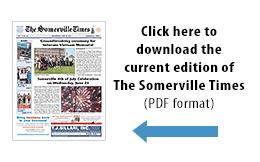by Julia C. Reischel
After two snow emergency cancellations, MBTA and other state officials successfully held the second public hearing regarding the Green Line extension Monday night at Somerville High School.
"This process you’re going through now is a fiction," Alderman-at-Large William A. White Jr., said to a panel of state officials sitting on the stage in the high school’s Eugene C. Brune Auditorium.
"Do what is right: abandon this process and live up to your commitments,” White said.
The public hearing was part of the state’s process of re-evaluatingits Air Quality Mitigation Transit Commitments, one of which is the Green Line extension to Medford.
The meeting was set up as a forum for the Somerville and Medford communities to address their concerns about the Green Line to the state and the governor, and drew hundreds of residents into the packed hall.
A follow-up to a Dec. 16 meeting at the State House, the March 14 meeting was chaired by Robert Gollege, commissioner of the state’s evironmental protection department, Daniel Grabauskas, the
governor’s transportation secretary, and Dennis DiZoglio, the chairman ofthe Boston Region Metropolitan Planning Organization.
The Somerville Transportation Equity Partnership spokeswoman Ellin Reisner said STEP campaigned vigorously to spur community turnout for the postponed meeting, which was supposed to be held on Jan. 24,during the blizzard, and Feb. 28, which became another snow emergency.
"We’re here to make out case which we’ve already made many times," Reisner said as she watched the crowd file in. "This looks like a good turnout."
"Again, we’ll hear the concerns of Somerville residents," said STEP member Karen Molloy. "We will stand firm on wanting them to uphold their commitment. Somerville residents are not going away—they are not backing down from their concerns."
"The state wants to be able to substituted the original commitment with some alternatives," Molloy said. "They want to replace it with the oxymoron of ‘bus rapid transit.’"
"We’ve been snowed out twice, but we can’t lose momentum now," said Mayor Joseph A. Curtatone.
“Turnout at these meetings sends the state a clear message that Somerville means business, that we are united in our desire for this
Green Line extension,” the mayor said.
Beginning at 6 p.m., STEP volunteers Karen Molloy, Steve Mulder and Jim McGinnis stood at the doors of Somerville High School handing out "Got T?" buttons and green glow necklaces that symbolized the Green Line.
Inside the doors, Reisner manned a table while community members lined up to fill out forms that would allow them to sign up for their turn to speak to the state’s panel. By 6:15 p.m., the entrance the auditorium was packed.
"We had 500 people turn out in October on the night that the Red Sox won the World Series," aid Stephen Mackey, the president of the Somerville Chamber of Commerce.
"This looks like it was about the same or more. It went well,” he said.
While waiting for the crowd to get seated, Gail Simms, a member of the Chamber of Commerce’s board of directors, chatted with Stephen Mackey and Adam Dash, other members of the board.
"The expansion of the Green Line could only benefit all of us," said Simms.
More than half the board of directors of the Chamber of Commerce was present, Dash said, as well as many important Somerville businesses, such as artist Daniel Maher, owner the Maher Stained Glass studio in Magoun Square.
"250 of our residents are from Somerville," said Kirk A. Ramsauer, the president of Ames Safety Envelope Co., a Chamber of Commerce member and the largest private employers in Somerville.
"This would be good for our employees, and therefore good for us,” he said.
The meeting did not start until 6:45 p.m., and when it did almost every seat in the auditorium was filled.
"I’ve never seen such an outpouring on behalf of a single project as I’ve seen with this project," Grabauskas said as he introduced himself and fellow panel members at the beginning of the meeting. "It is significant," he said.
Both Grabauskas and Gollege joked about the number of persistent e-mails and phone calls they had received from Somerville residents about the Green Line extension, drawing chuckles from the audience.
Dennis DiZoglio, the chair of the Metropolitan Planning Organization,described the re-evaluation process with the help of several charts and handouts.
He said that the state will use seven criteria to judge whether the Green Line extension is worth funding.
The seven performance measures the state will use to evaluate the Green Line and other transportation projects being considered by the state are utilization, mobility, cost-effectiveness, air quality,service quality, economic and land use aspects, and environmental justice, DiZoglio said.
"Projects that score well will advance," DiZoglio said. He said that the entire evaluation process will hopefully be completed by the end of this year.
After the panel’s brief introduction, it opened the floor to speakers from the community. First to speak was Rep. Michael Capuano, D-Somerville, who said he welcomed the panel to Somerville.
"This city has been underserved by the MBTA for all of my life," Capuano said. He rejected the Bus Rapid Transit alternative proposed by the MBTA as unacceptable, and then called upon the state to fulfill its commitment to the Green Line.
"Do everything you can to prioritize this project within budgetary restraints," Capuano said. "It will be the ultimate in urban, economic and environmental justice."
Capuano, who served as the city’s mayor from 1989 to 1999, before entering Congress, was followed by a parade of statements from Somerville’s elected officials.
Curtatone spoke to the panel about the benefits that a Green Line extension would bring to the region and the state. He said that that project would extend the creative economy of the region.
"A deal is a deal," Curtatone said. "We put up with a lot and get little in return—we deserve the Green Line for that reason alone."
"May West once said that one once of performance is worth one pound of promises," said State Sen. Jarrett T. Barrios, D-Somerville. "Just do it."
"Justice delayed is justice denied," said State Rep. Patricia D. Jehlen, D-Somerville. "This is a public health emergency."
Statements from the aldermen and members of the community followed, and were limited to two minutes each.
White broke the even tone of the speakers by raising his voice as he took the panelists to task.
"It’s killing us, gentlemen," said President of the Board of Aldermen Bruce M. Desmond in a brief statement.
In a joint statement, Ward 2 Alderman Maryann M. Heuston and Ward 3 Alderman Thomas M. Taylor said that the Green Line extension was crucial to the development of Union Square.
Heuson said she was upset to see the large flow chart of the re-evaluation process displayed on the stage.
"This is the second time I’m seen that flow chart," she said. "I don’t want to see it again."
Alderman-at-Large Denise Provost appealed to statistics in her statement. "Over 1,000 acres of the city are tax exempt," she said. "That is 51/2% of the land in the city, which adds up to $66 million in lost.
According to the city’s Web site, Somerville pays 4.5 $million to the MBTA annually.
The city assesor’s office, at the request of this paper, estimated that the MBTA owns $79 million worth of property, which if taxed as commercial property, would bring the city $1.6 million in annula property taxes.
At the request of this paper, the city assessor’s office conducted a study, which determined that the MBTA owns $79 million in property in Somerville. Were the MBTA land and facilities taxed as regular commercial property, the T would owe the city $1.6 million in annual taxes.
Many Somerville residents representing a variety of backgrounds, ages,
and lifestyles spoke as well.
"Please do not change your minds—it’s illegal," said an eight-year-old girl. "I want the air in Somerville to be clean."
Barbara Rubel, a Tufts University administrator, spoke on behalf of the university. "For the university to enjoy the benefits of the Green Line, it would have to go all the way to Medford," she said.
"A multi-stop light rail rapid transit system is the only solution that makes sense," said Joeseph P. Lynch, a member of the Magoun Square Neighborhood Association.
"Tell the governor that you’ve tried your best to delay the inevitable," he said. "Tell him it’s not working."
The postponed meeting on March 14 came on the heels of several important developments in Massachusetts transportation policy.
The cities of Somerville and Medford announced Jan. 12 in conjunction with the Conservation Law Foundation, a New England environmental advocacy organization, they planned to sue the state of Massachusetts for violation of the Clean Air Act because of its re-evaluation of its air quality commitments made in 1990.
The Conservation Law Foundation, filed a lawsuit March 14 in federal court against various officials of the Commonwealth of Massachusetts to enforce those public transit commitments.
"They could have passed it today, and they could have passed it in five years. So it’s great that they passed it today," said Wig Zaymore, a member of STEP.
Carrie Schneider, a legal fellow at CLF, was present at the hearing Monday night, hours after her organization filed the suit. "She must be very tired," Zaymore said.
At the meeting, Barrios reminded the panel of the lawsuit. "This is a promise that the city of Somerville has decided to take you to court to enforce," he said.
On the federal level, the House of Representatives approved a mammoth transportation bill March 10 that earmarked over $5 billion in funds for Massachusetts roads and rails projects.
A triumphant Capuano, who serves on the House’s transportation committee, referred to the bill in his remarks to the panel.
"$1.4 billion is coming to Massachusetts for transit," said Capuano to cheers from the audience. “Within that there is specific authorization for a Green Line extension."
In another development, Governor Mitt Romney Thursday issued a 500-page report outlining his plan for Massachusetts transportation for the next 20 years.
The governor’s plan does include funding MBTA expansions with state money and a plan to fulfill clean air requirements in Somerville, said State Rep. Carl M. Sciortino Jr., D-Somerville.
But, it specifically mentions that it may fulfill those requirements though programs other than the ones specified in the original 1990 agreement, he said.
According to STEP’s Web site, the state transportation plan states that air quality commitment stands and will be honored, but not necessarily through the three projects selected 15 years ago."
Sciortino said in his public testimony that he was not happy with the Romney transportation plan, "Our response to the report is that it is unacceptable to our community," he said. As he spoke there were more cheers.
Sciortino then asked the audience to tell the panel by a show of hands whether they wanted to see a change to the original Green Line agreement. The crowd responded with total silence.
When Sciortino asked those who wanted to see the old agreement honored, the auditorium erupted in cheers and a standing ovation.
Hathaway Fiocchi, a transportation associate with the Massachusetts Public Interest Research Group, said it is important to emphasis the state’s legal commitment to extend the Green Line to Medford.
"The Green Line extension to West Medford is a legal commitment that needs to be honored, and the proposed reevaluation process is dragging the date of completion and air quality benefits out further and further," Fiocchi said.
"We need to see money for the Green Line extension and the Big Dig transit commitments first and foremost—as commitments that restore air quality to our state, those commitments should be setting our transportation agenda,” Fiocchi said.

















Reader Comments